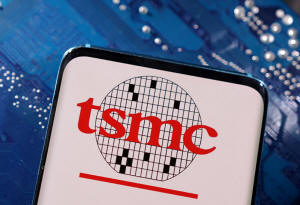TSMC rides AI demand to raise revenue forecast, says no to US joint
venture
 Send a link to a friend
Send a link to a friend
 [July 18, 2024] By
Yimou Lee, Ben Blanchard and Faith Hung [July 18, 2024] By
Yimou Lee, Ben Blanchard and Faith Hung
TAIPEI (Reuters) - Taiwan's TSMC, the world's largest contract
chipmaker, raised its full-year revenue forecast on Thursday given
surging demand for chips used in artificial intelligence, and rejected
the idea of a joint venture factory in the United States.
Taiwan Semiconductor Manufacturing Co Ltd (TSMC), a major Apple Inc and
Nvidia supplier, has benefited from the global AI boom that has helped
it weather the tapering off of pandemic-led electronics demand.
The bellwether for the chip industry earlier on Thursday posted net
profit that beat market expectations. It raised its 2024 revenue
forecast to growth of slight to above the mid-20% range in U.S. dollar
terms, versus a previous prediction of an increase in the low to mid-20%
range.
"AI is so hot; right now everybody, all my customers, want to put AI
functionality into their devices," Chairman and CEO C.C. Wei told
analysts and reporters at an earnings conference.
The company's U.S.-listed shares rose 3.3% in pre-market trading
following the results.
Its Taiwan-listed shares, however, closed down 2.4% before the earnings
announcement, extending falls this week after U.S. Republican
presidential candidate Donald Trump said that Taiwan "did take about
100% of our chip business" and should pay the U.S. for its defence.
TSMC is spending $65 billion on three plants in the U.S. state of
Arizona and has other new factories in operation or planning stages in
Japan and Germany, which have partner investors.
Asked if TSMC would consider a joint venture in the United States
following Trump's comments, Wei said no.
"So far we did not change any of our original plans of expansion of our
overseas fabs. We continue to expand in Arizona, in Kumamoto, and maybe
in future in Europe. No change in our strategy. We continue in our
current practice," he added.
On whether TSMC has enough capacity to support the demand for chips, he
said things were "very, very tight".

[to top of second column] |

A smartphone with a displayed TSMC (Taiwan Semiconductor
Manufacturing Company) logo is placed on a computer motherboard in
this illustration taken March 6, 2023. REUTERS/Dado Ruvic/Illustration/File
Photo

"We are working very, very hard to get enough capacity to support my
customers from now all the way to next year, to 2026."
CFO Wendell Huang said supply for leading edge nodes, including its
3nm and 5nm, would remain very tight next year.
SMARTPHONE CHIPS DEMAND
For the current quarter, TSMC said its revenue would increase by as
much as 34%, in a range of between $22.4 billion to $23.2 billion.
The company adjusted its capital expenditure plans for this year to
between $30 billion and $32 billion, compared with a previous
forecast of $28 billion to $32 billion.
TSMC's April-June net profit climbed to T$247.8 billion ($7.60
billion) from T$181.8 billion a year earlier.
The profit beat a T$238.8 billion estimate for the quarter ended
June 30, according to an LSEG SmartEstimate drawn from 21 analysts.
SmartEstimates give greater weighting to forecasts from analysts who
are more consistently accurate.
"Moving into the third quarter of 2024, we expect our business to be
supported by strong smartphone and AI-related demand for our
leading-edge process technologies," Huang said.
Second-quarter revenue at TSMC, Asia's most valuable publicly listed
company, rose by 33% to $20.8 billion, better than the company's
previous forecast of $19.6 billion to $20.4 billion.
($1 = 32.6000 Taiwan dollars)
(Reporting by Yimou Lee, Ben Blanchard and Faith Hung; Additional
reporting by James Pomfret; Writing by Anne Marie Roantree; Editing
by Christopher Cushing, Muralikumar Anantharaman and Emelia
Sithole-Matarise)
[© 2024 Thomson Reuters. All rights
reserved.]
This material may not be published,
broadcast, rewritten or redistributed.
Thompson Reuters is solely responsible for this content. |